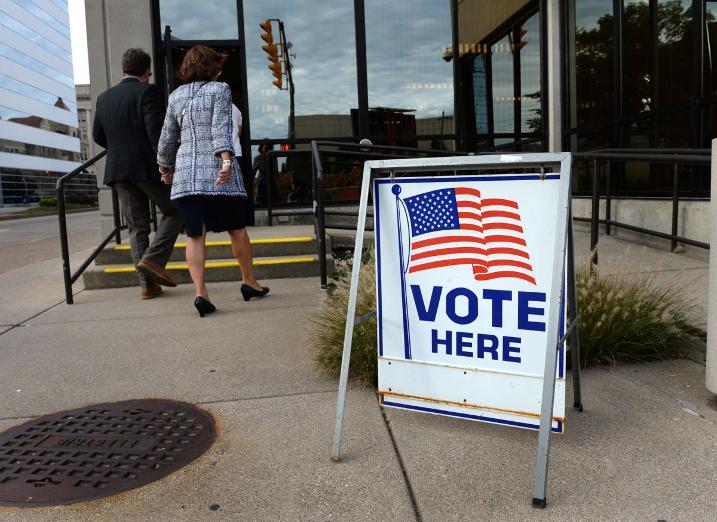2018 Mid-Term Elections Tips: Things You Should Know Before You Vote

By Dustin Alexander-Pérez, Editor-In-Chief | The Metropolitan Sentinel
Sunday, 4th November 2018 | 5:20 PM

Photo: Charleston Gazzette
WASHINGTON, D.C. - With the Midterm Elections just days away, the entire process can be very daunting and confusing. After all, there are referendums to learn about, debates to watch and ordinances and laws and candidates and everything else that comes with an election.
But, none of that counts if you're not registered to vote. It is technically never too late to register to vote. If for some reason, you aren't able to vote this time around, at least you'll have the peace of mind knowing that you are ready to go for the 2020 Presidential Elections.
There is a website can help you with that and it is jam-packed with a lot of great, non-biased information that you can call upon when preparing for election day. Visit www.usa.gov for more information. It has everything you need to know about the election process and voting. Our website, in conjunction with Rock The Vote, now offers secure online voter registration HERE.
On their website, you'll find things like common voting and election terms. Congressional state and local elections. In fact, you can learn what the midterm is all about and why it is between presidential elections. You can also find your state or local election office website. If you're a history like this writer, voting and election laws and history will interest you.
The most important thing in that section of their website is the opportunity to register to vote , update your voter registration, find out about your state of local elections You can simply confirm your information as well so if there is an error, you can get it corrected right away.
Absentee and early voting is a wonderful way to vote if you can't physically make it to the poll or simply want to get your vote cast early and avoid the lines. This writer votes absentee constantly for the mere fact that I am able to take my time and mull over my options.
When I used to go to the polls, inevitably I would get sidetracked by someone wanting to do an impromptu "meet and greet" or chit-chat. Nobody loves mingling with my viewers and friends, but being a parent with teenagers in tow doesn't always make for the best social situations. Children – another great reason to vote absentee.
You don't need any explanation or excuse to request an absentee ballot, but there is a deadline to ask for one to be mailed to you. In most cases, that deadline is October 30th. Check with your state's election offices to see what their schedule looks like.
You can go and vote in person even before election day as well. This is also considered an absentee ballot. Normally, you don't need and appointment, but proper etiquette and good time-management skills dictate that an appointment, reservation or even just calling ahead of time to arrange something with the clark is appropriate.
If you are not registered to vote, but this article has so inspired you to do so on Election Day, you can register, but you will be given a "Provisional Ballot." Your local polling place can assist you.
For the procrastinators who like pushing deadlines, the system has you in mind. You have up until 5:00 p.m. on Election Day to have your ballot postmarked at any post office, but the ballot only has three days to make it to its destination or it won't be counted if it arrives past that time.
You also have until just minutes before the polls officially close to hand deliver or have your ballot hand delivered to any polling place within the state you are registered in. For example, if you live in California and are away on business in San Francisco, but are domiciled and registered in Los Angeles which is almost six hours away, you can drop your ballot off at any poll you choose in Northern California although you are listed as a Southern California resident.
The following are some tips that will help make the voting process a lot smoother if you choose to go in person on Election Day, Tuesday 6 November 2018:
-
Be prepared. Find out where you are required to vote. You can't just pick the nearest polling place and drop in for a vote. If you aren't at your voting place assigned to you, you'll still be in the role, but will be instructed where to go to vote. The only exception to this rule is if you are turning in an absentee ballot. There is an excellent logistical reason for routing people and car and foot traffic around polling places.
-
Don't wander or get lost into any other part of the building you are voting at. I know this sounds really parental to mention, but some polling places are actually on the campus of elementary and high schools. Therefore, avoid any problems by getting in and getting out of the polling place as soon as you are finished. There have been people who innocently got lost that were detained at length and questioned because of poor planning of the facility managers of those particular places. Follow the signs and you should be alright. Campuses have improved measures to guarantee silly mistakes don't happen.
-
Polls are usually open from 7:00 A.M. To 8:00 P.M. in your respective time zone. They will not allow anyone in before opening time and as long as you are in the door by 8:00 p.m., even if it takes you ten minutes to vote and you leave at 8:15 p.m., your vote will still count. Again, check with your local polling place for more information.
-
Do social hour somewhere else and think before you start spouting off about your candidate. Don't publicly gripe about any candidate either. Serious fights have broken out in polling places in the past that have been so disruptive that in one case the polling place had to be locked down for 20 minutes and it completely disqualified several legitimate votes from being counted.
-
It is illegal to “electioneer” within the polling place. What this means is you can not give out handbills with your candidates information on it. That is allowed, however, outside, but several feet away from the entrance. And if you are approaching the polling place and an electioneer becomes aggressive with you, report it immediately to the security detail or police officers that will be stationed at the polls for your protection. Electioneers know the rules state they only get one opportunity to hand you a political pamphlet and if you ignore or refuse it, they must move on to the next person.
-
You must have ID. Bring your state or government issued picture ID or driving license or passport with you in order to receive a ballot. With voter fraud so common, honest polling places follow the law and enforce the identity burden of proof on everyone.
-
Decide your vote. Know who you're voting for ahead of time. You won't be allowed to ask any of the poll workers or judges assigned therein for any thoughts on how to vote. And if you're going to ask someone who they are or did vote for, consider taking that conversation outside and away from your neighbours, the people you have to live near.
-
You can vote a mixed ticket. This is not the case in the primary voting process where you have to separate the “wheat from the chaff” and vote a straight GOP or Dem ballot.
-
Consider Absentee Voting. Take advantage of the luxury of voting absentee. But, when casting such a ballot, most of them require that a witness place his or her signature on your ballot envelope. There is no reason for anyone else, not even your county clark, to see your actual, completed ballot. More information about voting in this manner can be found on the aforementioned government website you can learn about absentee and early voting.
-
Make sure you're old enough. Voter registration minimum age requirements are very important to know as they do vary from state to state. In most states a citizen must be at least 18, however Colorado, Florida and a few other states allow people to register to vote as early as age 16 and 17. There is no upper age limit, but you need to talk with election officials if you are elderly and need help casting your vote.
-
Do your homework. While the government website does not recommend who to vote for, there are ways to find out how to research each candidate, print a sample ballot and learn how to write in candidates for federal and state elections.
-
Watch debates. Watching the debates is a good way to learn about candidates and issues the same time you need to view debates with a careful eye to get the most information know who's running and research their views. Another good idea you can check out your US Representative and state congressman by visiting Congress.gov for those who have helped State office check your state legislature website ballot measures to learn more about these in your state contact your local state election office links.
-
You can vote for yourself. You can even vote for Mickey Mouse or Jesus as "write in” candidates for federal and state elections in many places. If you're simply not satisfied with a candidate among several you may have to choose from, you are allowed to write even your name as an optional candidate. But, be prepared if you do extend yourself in such a manner. For example, if 15 out of 20 people vote for you as a write in, you will win whatever seat it is in that election. It's happened by fluke in the past with mixed results. Mickey and Jesus are most popular write-ins. Wouldn't it be a hoot if one of them actually won someday?
No matter what you decide to do on Election Day, vote or not vote, the decision is as always in America entirely your business. While it is very true that anyone who doesn't vote really isn't entitled to gripe about the final results, there are valid arguments why Americans refuse to vote.
And whoever you are voting for, in most cases, remember that your particular candidate will be in office for the next four years. Ask yourself if your life and community will be better in four years with certain candidates in office or if everything will just be the same or possibly even worse.
Another point I should bring up is about having a camera in the polling place; unless you are a member of the press, you shouldn't have recording equipment in the polling place ever. Be polite and leave your mobile devices on silent as the polling places are quiet zones in most precincts.
Further Reading: Here are some other non-partisan resources you may find helpful.
•http://www.ncsl.org/ •https://www.vox.com/ •https://www.pbs.org/
Dustin Alexander-Pérez
